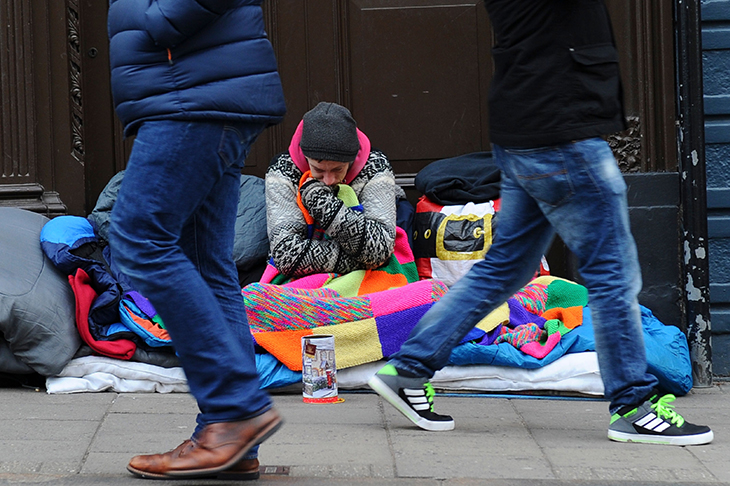Over the years, I have spent around five months sleeping rough on the streets of London, Birmingham and New York, making undercover TV programmes. Matthew, who works in my Westminster office, spent last summer involuntarily homeless after he was cheated by his business partner. I suspect we are the only people within the Palace of Westminster who have been through the unpleasant experience of sleeping rough, and we both have come to the same conclusion. Street homelessness (as opposed to the homelessness of temporary accommodation) is, for the most part, a symptom or consequence of a different problem: addiction to drink or drugs, or mental illness. If politicians want to deal with it, they must accept this.
Homelessness is a popular subject in SW1. It enables both sides of the political divide to project their prejudices onto the least fortunate. The right tell them to get a job; the left see them as victims of inadequately funded services by the state. But both sides have a point: for the addicted or the mentally ill to even get near a job, many will need the intervention of social services.
Rough-sleeping could and should be a cross-party issue, but for this to happen, everyone must wake up. The left in particular must accept what George Orwell called ‘unacceptable facts’ — and here follow a few from our own experience that will tweak the noses of the pious.
Most beggars are kept in heroin or drink by the kindness of strangers. If you give money to a beggar you are almost certainly enabling the addiction that put them on the street. Here’s the test — look at the recipient’s teeth. If theirs are carious, blue-black Elizabethan stumps or they have none at all, their owner is a smack addict. Staff at the homeless charity St Mungo’s told me of one addict who now wishes the public had not given him cash for ‘a cup of tea’ or ‘a hostel’ because it enabled for a decade the habit that lost him a leg. ‘If I hadn’t been given that money, I would have got help much sooner,’ he said. Beggars in London can make more than £100 a day; in places such as Winchester or Oxford, where there is a huge oversupply of credulous tourists and students, they make even more. Having a cute puppy, I was told, increases your take.
Another ‘unacceptable fact’ is that some people do choose to live on the streets. When I spoke in a Westminster Hall debate I said this and a Labour MP interrupted me to say: ‘I simply cannot believe that anyone would choose to sleep rough.’ This rhetorical technique is what Richard Dawkins calls the ‘Argument from Personal Incredulity’, and it’s as useless in examining homelessness as it is in taking on the arguments against evolution. A person’s failure to believe something does not make it false. A minority of people do choose to sleep rough. Some don’t like the rules enforced at night shelters that forbid drink and drugs; a smaller number like the escape from bourgeois conventions and responsibility.
Some months ago, I slept out for a few days behind the goods-in entrance of McDonald’s by Westminster Cathedral where many addicted to the horrific synthetic cannabis ‘spice’ are turned into zombies. There I made friends with an alcoholic in his thirties called Andy who showed me the keys to the flat he lived in — he does not actually live there, he told me, because he gets so very lonely, and on the street the passers-by now freely pay for his beer.
What’s more, in the summer sleeping rough is not that unpleasant, certainly more comfortable than being on army exercise (if you are of sound mind, able-bodied and not in the throes of addiction). Trouble is, what starts as a street party or escapism for some can turn into a downward spiral of addiction and mental illness.
What was depressing in our experience on the streets recently was how little had changed since the early 1990s. Despite billions of pounds of public money, countless worthwhile charitable initiatives and royal visits, Matthew and I saw the same cohort of the addicted and the mentally ill. What, then, is to be done? This is where we need to listen to both the left and the right.
The public must stop giving cash directly to beggars. (The Oxford University business incubator has developed an app to give money to beggars via an account where it can be used as a deposit on a flat or for food.) In addition, money must be allocated for emergency mental health assessments. Someone with a serious psychiatric illness is extremely unlikely to be able to maintain a tenancy. Mental health support should be embedded within outreach teams, so that the money goes to the tip of the spear, and then follows people through the system rather than being absorbed by general mental health budgets.
Lastly, the ‘Housing First’ policy, which puts a homeless person in accommodation before asking them to deal with their addictions, is very obviously the right one. It has been a great success in Finland and America and is being trialled in three cities here.
That those least able to help themselves end up homeless is ultimately driven by another unacceptable fact: we are not building enough new homes. This is in part about immigration. For 2018, net international migration was estimated at 275,000, and there were 121,000 more births than deaths: 396,000 more people. But for many years, housing stock has not kept pace. You cannot keep adding to your population while failing to build enough new homes.
All in all, we are mostly only dealing with the symptoms of homelessness rather than its causes — and in the process we are keeping those most unable to help themselves on the street.
Got something to add? Join the discussion and comment below.
Get 10 issues for just $10
Subscribe to The Spectator Australia today for the next 10 magazine issues, plus full online access, for just $10.
You might disagree with half of it, but you’ll enjoy reading all of it. Try your first month for free, then just $2 a week for the remainder of your first year.














Comments
Don't miss out
Join the conversation with other Spectator Australia readers. Subscribe to leave a comment.
SUBSCRIBEAlready a subscriber? Log in